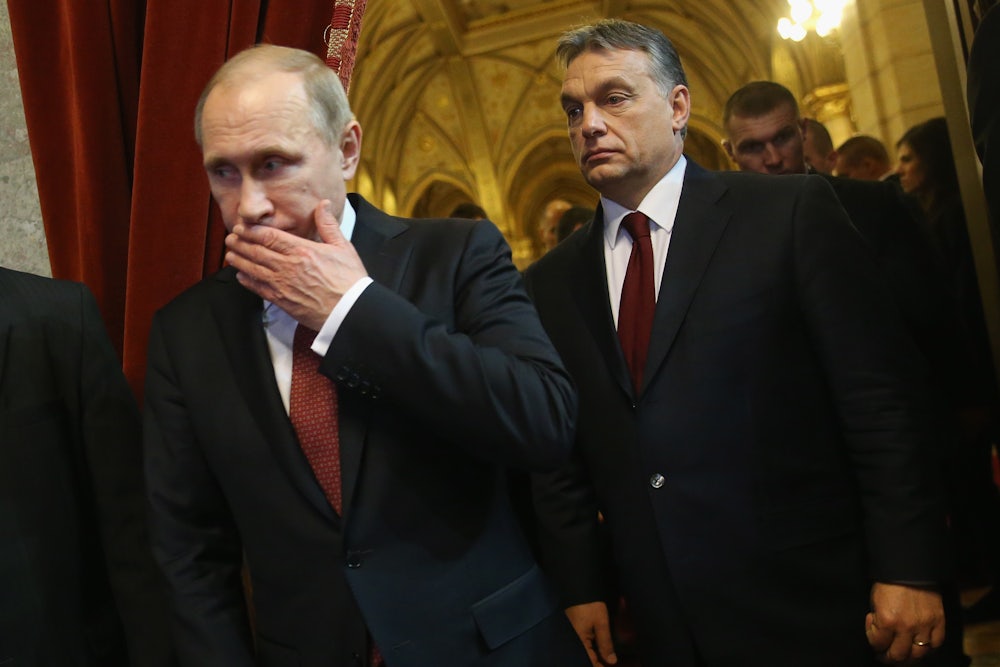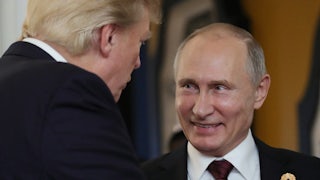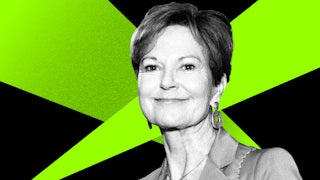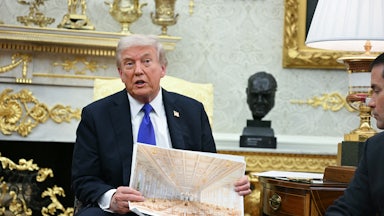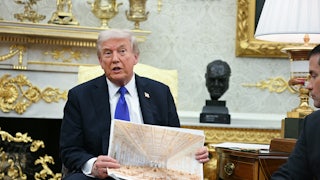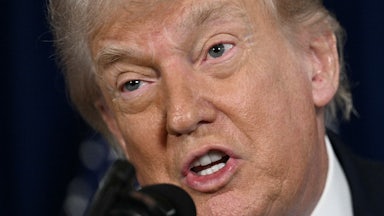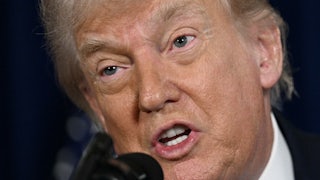Come May 18, the Conservative Political Action Conference (CPAC), for nearly 50 years the largest and most influential gathering of conservatives in the world, will assemble in Budapest, with Hungarian Prime Minister Viktor Orbán as its keynote speaker.
That means leading American conservatives who are supposedly deeply committed to the ideals of personal liberty, limited government, free markets, human dignity, and the like will be joining forces behind one of the most authoritarian and antisemitic heads of state in the world. The speakers reportedly will include Orbán, who won his fourth term as prime minister on April 3; Eduardo Bolsonaro, the son of Brazil’s president; and Santiago Abascal, leader of Spain’s far-right Vox party.
At this writing, it’s unclear which big name American conservatives will be headlining the event. “I can’t tell you who is actually scheduled to speak,” said Daniel Schneider, executive director of the American Conservative Union (ACU), which sponsors CPAC. In recent months, however, Marjorie Taylor Greene, Alex Jones, and Tucker Carlson, have all made highly visible appearances on the Orbán bandwagon, with Carlson repeatedly extolling the virtues of the Hungarian strongman to millions of viewers on Fox News.
The hard-right’s growing affinity for Orbán’s Hungary should come as no surprise to anyone who has followed how the Republicans became Putin’s Party and how they have responded to the ongoing Russian atrocities in Ukraine. Think of Hungary in terms of Russia’s trajectory in recent years, during which Putin ushered in an era of global theft on an unimaginable scale, putting together a mafia state in which his handpicked oligarchs had monopolistic control of Russia’s strategic resources—an authoritarian kleptocracy in which billions in dark money were stashed in anonymous shell companies. As has been widely reported, Ukrainian-born billionaire Leonard “Len” Blavatnik, a naturalized American citizen, has contributed millions to leading GOP candidates, including Donald Trump, Mitch McConnell, Marco Rubio, and Lindsey Graham. Similarly, as I reported in House of Trump, House of Putin, and American Kompromat, Russian oligarchs have paid countless millions to huge white-shoe American law firms representing their banks and energy companies and have plowed millions of dollars into supporting right-wing, populist movements elsewhere in the West.
But now that Russian atrocities in Ukraine dominate the news cycle 24/7, the mechanisms through which Putin’s propaganda, disinformation, and dark money flow to the West are finally being shut down. More than a thousand Russian businesses and individuals have been sanctioned. Russia has defaulted on foreign loans. Its banks have been removed from Swift. All Russian flights have been banned from United States, the U.K., the EU, and Canadian airspace. New investment in Russia from the West is being shut down. Yachts are being seized. One by one, the faucets are being turned off. And, as The Bulwark put it, that’s why the right has begun to increasingly “launder its Putinism” through support of Orbán.
Indeed, Putin has become so toxic that even the sponsors of CPAC Budapest take pains to assert—rather unconvincingly, I might add—that the Hungarian prime minister is no friend of the Russian ruler. “It’s untrue to say that Orbán is an ally of Putin,” ACU’s Daniel Schneider told me in a phone interview in which he further asserted that “Hungary and Orbán voted for sanctions” against Russia.
But that assessment does not hold up under close scrutiny. Even in the wake of Russia’s murderous attacks, Orbán has declined to criticize Putin directly, has prohibited arms shipments to Ukraine through Hungary, and has fought proposals for EU sanctions on Russian natural gas.
It is true that initially Orbán condemned the Russian invasion and did not veto the EU sanctions against Moscow, a stance that helped him win reelection on April 3. But just four days later, on April 7, Hungary announced that it would continue to receive nuclear fuel for power plants from Russia. Ukrainian Foreign Ministry spokesman Oleh Nikolenko said that now that Orbán’s election is over, Hungary is “on to the next step—to help Putin continue his aggression against Ukraine.”
Hungary’s position is particularly striking in view of the astonishing unity of the rest of Western Europe. As a member of both NATO and the European Union, Hungary is the only country in those organizations that remains firmly in Putin’s pocket. It is the fox in NATO’s henhouse.
“For CPAC to have its conference there, it’s absolutely a security threat,” says Richard Kraemer, senior fellow at European Values Center for Security Policy and the co-author of a recent report for the center that characterized Hungary as a Russian proxy state. “Just take the International Investment Bank [IIB] in Budapest as an example. It’s essentially a staging ground for Russian intelligence interests. Everyone at the bank has diplomatic immunity. Why you need that is completely beyond me.”
Kraemer noted that the president of the IIB, Nikolai Kosov has long-standing ties to Russian and Soviet intelligence through his parents, Nikolai Kosov and Yelena Kosova, both of whom were well-known KGB agents.
In a similar vein, a piece by Dr. András Göllner in the Hungarian Free Press notes that Budapest is home to approximately 1,000 members of the Russian secret service, many of whom are allowed “to work and travel without any restrictions within the EU, and more importantly, to travel to the USA without a visa.”
A Hungarian born author and academic who is emeritus professor at Concordia University in Montreal, Göllner worked with Orbán in the 1990s but broke with him in 2001 “after I became aware of his wholehearted embrace of corruption.”
Such security vulnerabilities are compounded by rampant corruption in Hungary, which will now provide a place for CPAC political operatives to mix with intelligence assets and the criminal class of Hungary and Central Europe. “It’s mind-blowing,” Göllner told me. “It’s almost as if the FBI or the Department of Justice decided to hold a bash in a village in Sicily that is the home of organized crime.”
There were other alternatives. “Paris is a nice place,” Göllner said. “London is nice. Why did CPAC choose to have the conference in the center of criminal activity? Because they can make financial transactions with the criminal class of Central Europe for funding that provides the leverage to gain political influence.”
The Hungarian connection with the Republicans dates to 2008, when Arthur Finkelstein, the late GOP political consultant, secretly worked to get Orbán elected. Finkelstein, you may recall, was the legendary Republican attack dog and “merchant of venom” who did more than anyone else in the U.S. to transform the word “liberal” into a vile political epithet. Finkelstein’s greatest strength as a political warrior was a shamelessness so profound that it allowed him—a gay Jew—to mastermind viciously homophobic and virulently antisemitic political campaigns without the slightest compunction. In 1996, Finkelstein was “outed” by Boston magazine in an article by Steve Rodrick that I edited. It noted that his clients—Senator Jesse Helms (R-NC), Lauch Faircloth (R-NC), and Don Nickles (R-OK) among them—were instrumental in defeating a bill that would ban anti-gay job discrimination.
When it came to helping Orbán get elected prime minister in 2008, once again Finkelstein’s shameless hypocrisy won the day. As Buzzfeed described it, at the heart of Finkelstein’s secret work for Orbán was the demonization of George Soros via a series of antisemitic attacks on the billionaire investor. The fact that Soros had not lived in Hungary for years was of no consequence. He was a rich Jew and a liberal who supported protecting the climate, equality, and the Democrats, so Finkelstein devised a massive campaign that transmogrified Soros into a dangerous and conniving Jewish billionaire who could be portrayed as an enemy in different countries all over the world. Before long, there were billboards all over Hungary featuring Soros with the text “Don’t let him have the last laugh.”
With the exception of Paul Manafort, who helped elect pro-Putin candidates Viktor Yanukovych as president of Ukraine and Donald Trump in the United States, no American political consultant did more for the Russian president than Finkelstein. Putin liked Finkelstein’s anti-Soros campaign so much, he joined in with antisemitic dog whistles. Similarly, Donald Trump’s final TV ad before the 2016 election featured Soros as a force representing “global special interests” who do not have “your good in mind.”
The campaign was so successful that Finkie, as Orbán called him, got a home in Budapest and served as the prime minister’s chief strategist for 10 years, according to the Hungarian Free Press. As Steve Bannon put it, by helping Viktor Orbán get elected prime minister, Finkelstein allowed Hungary to give birth to “Trump before Trump.”
Meanwhile, Orbán had his own ties to Russia’s mafia state through Semion Mogilevich, the so-called Brainy Don of the Russian Mafia, who is alleged to have orchestrated a vast array of global crime scams, often working out of Budapest, and is back in the news with a bounty on his head. On April 6, in partnership with the FBI, the State Department’s Transnational Organized Crime Rewards Program put out a $5 million reward for information leading to his arrest and/or conviction “for his alleged participation in a scheme that defrauded thousands of investors out of more than $150 million.”
Especially renowned when it comes to money laundering, Mogilevich and his network have been particularly successful in using resources culled from organized crime to win favor among the powers that be. Back in 1984, David Bogatin, a Russian mobster who had ties to Mogilevich, met with Donald Trump and laundered millions through Trump real estate, buying five different condos in Trump Tower.
In addition, as I reported in House of Trump and House of Putin, Orbán’s ties to the Russian Mafia date back to 1994, when Mogilevich was allegedly overseeing a vast array of criminal operations for that organization—arms dealing, contract murder, drug trafficking, pump-and-dump stock swindles, extortion, sex trafficking, and more—based largely out of Budapest. His close ties to the powers that be in the post-Soviet world, including Hungary, were crucial to Mogilevich’s success.
It was in service to this network that Mogilevich allegedly arranged for Dietmar Clodo, a longtime associate who was a suspected drugs and arms trafficker, to make a one-million-deutschmark payment to a rising young star in Hungarian politics who had been instructed to come by and pick it up in a suitcase. Given the scale of his operations in Hungary, Mogilevich wanted to make sure the authorities looked the other way. This was protection money.
As Clodo recalled, when the man arrived, he “didn’t want to come into the house. I told him, ‘Listen to me. I have that damned money in a suitcase. I don’t want to go out in the street with the suitcase. If you refuse to come in, I’ll give it back to Mr. Mogilevich. I don’t care.”
Of course, Clodo didn’t explain why he really wanted the transaction to take place indoors—namely, that there was a hidden camera recording the transfer.
At the time, Clodo didn’t even know the name of the young pol who had arrived on his doorstep, but it turned out to be Viktor Orbán, of Fidesz, Hungary’s right-wing populist party. Orbán went on to become prime minister from 1998 to 2002 and from 2010 to the present. Throughout his early career, and even in his first term as prime minister, starting in 1998, Orbán was quite free in criticizing the Kremlin and denouncing other European governments as Moscow’s puppets. But in 2009, he abruptly reversed field and became a key Putin apologist.
And what was behind Orbán’s dramatic U-turn? In 2008, Semion Mogilevich had been jailed in Russia on tax evasion charges and desperately wanted to get out. According to Dietmar Clodo, as first reported by Anastasia Kirilenko on The Insider, that’s when Mogilevich gave the videos of Orbán taking the million-deutschmark payment to the Financial Stability Board in exchange for the Kremlin’s agreement to release Mogilevich.
In other words, thanks to Mogilevich, Putin had Orbán exactly where he wanted him. “Whatever happened to Orbán in such a short period of time?” asked The Insider in a story whose headline provided a likely answer: “A Suitcase Full of Cash from the Solntsevo Mafia: Does Putin have a Video Kompromat on the Hungarian Leader.”
In the years since, Orbán has become an astute practitioner of the authoritarian playbook. He centralized power, changed elections laws in his favor, assembled his own clique of oligarchs, promoted white Christian nationalism, passed anti-LGBTQ legislation, curtailed freedom of the press, cracked down on dissent, and drew closer to Putin.
He also began to raise his profile in the West with the help of Fox News host Tucker Carlson. Now one of Orbán’s most fervent fanboys, Carlson already had family ties to the Hungarian leader through his father, Richard Carlson, whose lobbying firm, Policy Impact Strategic Communications, is a registered lobbyist for Orbán. According to The New York Times, in 2019, the firm introduced Tucker to the Hungarian ambassador, set up an interview on Carlson’s show that year with Hungary’s minister of foreign affairs and trade, and otherwise helped Fox News orchestrate meetings and interviews with relevant Hungarian officials.
Then, last August, Carlson spent a full week broadcasting his nightly Fox News show from Budapest, replete with fawning interviews with Orbán and gushing voice-overs about how Hungary was a “small country with a lot of lessons for the rest of us.”
Earlier this year, Carlson went even further, releasing a “documentary” called Hungary vs. Soros: Fight for Civilization, which portrays the country as a rightist utopia that has conquered illegal immigration thanks to its supposedly impenetrable border fence. Not one to shy away from antisemitism, Carlson depicts Soros as a villainous Jewish financier pulling the strings of the world leaders, directing a global conspiracy to keep borders open, and serving the interests of leftist ideologues through his support of civil society groups. “It’s appalling to see Tucker Carlson and FOX invoke the kind of anti-Semitic tropes typically found in white supremacist media,” tweeted Jonathan Greenblatt, CEO of the Anti-Defamation League. “There’s no excuse for this kind of fear mongering, especially in light of intensifying #antisemitism.”
Whether Carlson shows up in Budapest or Marjorie Taylor Greene comes with her Jewish space lasers, CPAC’s expansion into Hungary and other countries—it has similar events planned in Brazil, Israel, Japan, South Korea, and more—raises a number of troubling questions.
Inept as the Russians have been in invading Ukraine, it is easy to forget that not too many years ago they created an amazingly creative and efficient new kind of hybrid warfare that eschewed bombs, bullets, and boots on the ground for a sophisticated blend of disinformation, cyber warfare, kompromat, and the like, in the end helping install Donald Trump in the White House.
All of which creates opportunities for CPAC conferencegoers to seek out opportunities to reap the same kinds of vast sums that Manafort and Finkelstein got from Putin’s and Orbán’s coffers. It comes at a time when effects of the sanctions have not yet been fully felt, but are just starting to kick in. “I think the new sanctions are quite effective,” says Swedish economist Anders Åslund, the author of Russia’s Crony Capitalism. “Oligarchs are being sanctioned and are losing property the world over.”
However successful they turn out to be, it will be important to keep an eye on Hungary. Because it is integrated into both the EU and NATO while Orbán maintains his loyalty to Putin, the conference in Budapest provides fertile breeding ground to resurrect Putin’s most effective influence operations. As the only Putinist in power in the EU, Orbán is a pivotal force promoting Putin-style authoritarianism in the West.
